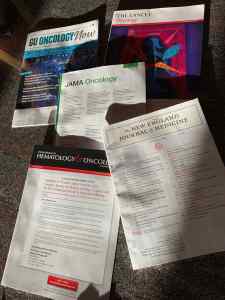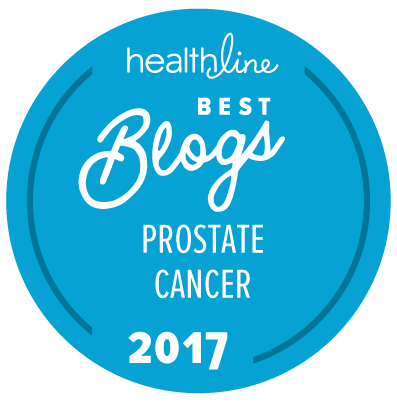To view this on my blog site, sign up to be notified of future posts or add comments, please click here.
In my book club (all old men from various backgrounds – medicine, law, business, politics, academia, etc.) we read a book called “Artificial Intelligence: Confronting the Revolution“. In it, the author describes the various scenarios underway to deal with massive amounts of information. Far beyond Deep Blue, the chess computer that beat Kasparov in 1997, AI may help physicians of the future make great diagnoses and decisions and is already being tested in difficult settings like the early detection of pancreatic cancer.

Until then, for me at least, drowning in the information for oncology in general, and even just for prostate cancer is becoming daunting. Gone are the days when reading the New England Journal of Medicine would keep you abreast of the most important advances. This is a photograph of the journals that arrived just this week, all provided for “free” (and without my request) by the endless advertising in the first pages.
In “GU Oncology Now” there is a summary of important papers presented at the Society of Urologic Oncology 2021. For prostate cancer two papers on PSMA imaging and therapy (which I have covered elsewhere), one on racial differences and treatment patterns, and an ad for “why is precision medicine complicated in advanced prostate cancer?” (See the answer here) Hematology and Oncology covers “highlights from the 2021 European Society for Medical Oncology Congress and the 2021 AUA Meeting”. That one has 4 articles on darolutamide, 3 on enzalutamide, 2 on PD-1 inhibitor trials, and “meeting abstract summaries with expert commentary”. Scanning them, I find that for the most part I have already commented on many of them in this blog, so I move on to: This week’s NEJM. There, in looking at the table of contents, I find articles on diabetes control using “closed loop” glucose monitoring and insulin administration, use of oral microbiome therapy for c. diff infections, antibiotic prophylaxis for rheumatic heart disease, and one on 24 hour urinary sodium excretion and cardiovascular risk. Whew…nothing on prostate cancer –but wait, there IS one on an antibody drug conjugate for treating lung cancer…I wonder if it could have any role in the small number of prostate cancers that also have HER-2 mutations??
Oh, well, let’s move on… The Lancet Oncology has 12 original articles, 11 commentaries and 6 letters to the editor, and there are a couple of the letters that deal with prostate cancer from researchers I know personally. But wait – they are available online at “e7” and deal with “radiographic progression-free survival in the ACIS trial”. I already know about that since I was a monitor for that trial, so guess I’ll pass. That leaves JAMA Oncology. OMG! The first three articles I really do have to read. Here it goes:
- “Changes in Prostate-Specific Antigen Testing Relative to the Revised US Preventive Services Task Force Recommendation on Prostate Screening” This turns out to be an analysis of Blue Cross Blue Shield beneficiaries (some 8 million or so) aged 40-89 between 2013 and 2019. During that time, the USPSTF changed its guidelines from “not indicated” to “shared decision” and sure enough, PSA testing increased 10% among men 40-54 years old, 12% in those 55-69 years old, and 16% in the group least likely to benefit, aged 70 to 89. Hmmm.
- “Association of Treatment Modality, Functional Outcomes, and Baseline Characteristics With Treatment -Related Regret Among Men with Localized Prostate Cancer” Wow – I talk to men about treatment decisions like this almost every week. This one looked at 2072 men with localized prostate cancer diagnosed in 2011 and 2012, then analyzed in late 2020/early 2021, so almost 10 years of followup. The number of interesting observations in the 3 tables and 2 figures found in the article are too numerous to go over in this blog, but among them are more treatment regret among patients who received surgery or radiation vs those who chose active surveillance, less treatment regret in college or more graduates, and as expected more regret in men who had health problems related to treatment. But the concluding paragraph says it all:
“The findings of this cohort study suggest that more than 1 in every 10 patients with localized prostate cancer experience treatment-related regret. A disconnect between patient expectations and outcomes, both as it relates to treatment efficacy and adverse effects, appears to drive treatment-related regret to a greater extent than factors including disease characteristics, treatment modality, and patient-reported functional outcomes such as urinary incontinence and other urinary symptoms, erectile dysfunction, or bowel dysfunction. Thus, improved counseling at the time of diagnosis and before treatment, including identification of patient values and priorities, may decrease regret among these patients.” I guess this validates the way I often end up my own counseling sessions: “Unfortunately, Mr. (and Mrs. in some cases) XYZ, there just isn’t any way to treat the prostate gland without causing some side effects.” - “Outcomes of Screening for Prostate Cancer Among Men Who Use Statins”. This one is from Finland where we spent a lovely year on sabbatical in the mid-1980’s. My wife studied the Finns’ vaccination data for childhood meningitis, and I did a year in a molecular biology lab. We both were impressed with the Finnish Public Health system. The article utilized that system’s extensive database to evaluate the effect of statin use among 78,606 men who were part of a randomized study to evaluate PSA screening effects. The incidence of low grade (Gleason 6) cancers was reduced among the statin users, whereas detection of high risk cancers (Gleason 8-10) was similar. Buried in the data (3 figures, 2 tables) is a nugget. There is a trend towards decreased risk for all kinds of prostate cancer among statin “ever” users vs. non-users although no difference in mortality. Still…the study seems to support my bias that if tolerated (~5-10% of patients on statins develop muscle inflammation) most of my patients might benefit from being on statins.
Well, that’s it for this week’s journal arrivals. I won’t bother you with the 5-10 emails I scan every day from all sorts of “Web MD” and “Grand Rounds in Urology” places with even more to try and digest. How anybody can be a general medical oncologist these days and care for everything from lymphoma to breast cancer is truly amazing. Fortunately, there are expert resources like the NCCN Guidelines that are really helpful. Goodness knows we need them, and maybe AI will save us, but I’m not so sure.
Take a look, for example, at just the number of articles published so far in 2022 on statins and prostate cancer. Good luck 😁.




Dr Glode – as you nicely illustrate, the quantity of information about prostate cancer is ballooning. As a patient I focus on information that is specific to my condition. Just triaging information specific to me is a time-consuming task. I have often wondered how physicians keep up on a much broader scale. Keeping up with technology in my former profession was always a challenge. Search algorithms that focused on keywords, phrases, companies, journals, technologies, etc. were helpful but often lacking. A team approach was the best. I too am hopeful application of better AI may help.
While the amount of the latest information on PC is often overwhelming, I am grateful there is that much attention being devoted to understanding PC and potential treatments. It does give one hope for the future.
It is indeed encouraging. At the dawn of the Internet (now internet, but then the “www”), as an early adopter, I gave talks to colleagues on “how it works” with illustrations of html and information packets. One illustration was to show the number of “hits” in searching for breast vs prostate cancer. In those days it was dramatic. Just for fun, here’s today’s google search results:
Breast Cancer: About 648,000,000 results (0.72 seconds)
Prostate Cancer:About 247,000,000 results (0.65 seconds)
As you probably know, these data are somewhat reflective of funding as well:
NCI Breast Cancer Research (2018): $575 million
NCI Prostate Cancer Research (2018): $239 million
But the good news for all is that cancer deaths in the last 20 years are down 27% https://www.cdc.gov/cancer/dcpc/research/update-on-cancer-deaths/index.htm
Thanks, doc, very interesting!